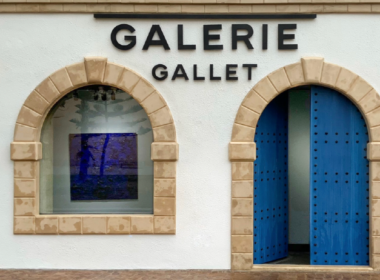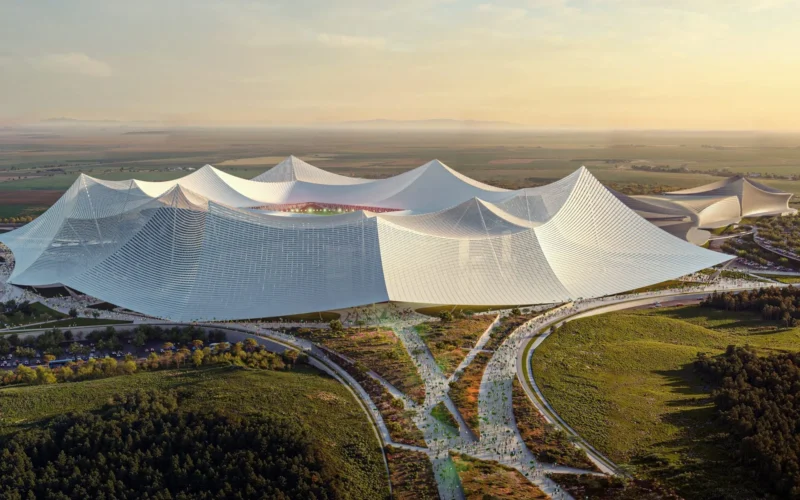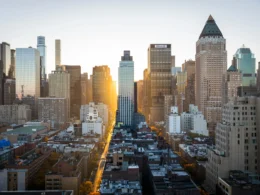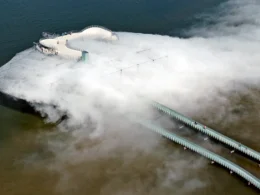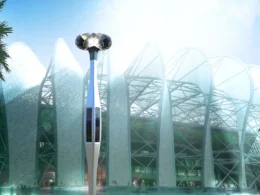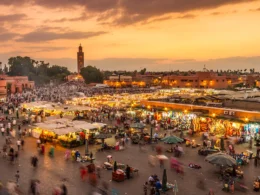As Morocco prepares to co-host the 2030 FIFA World Cup alongside Spain and Portugal, the nation is undertaking significant projects to ensure the success of this huge event. With a focus on world-class stadiums, improved infrastructure, and innovative technological solutions, the country is positioning itself as a prime host for the event. From modernized venues to efficient transportation networks, Morocco’s commitment to creating a seamless experience for players and fans alike is evident across its extensive development projects.
Table of Contents
Stadium Preparations
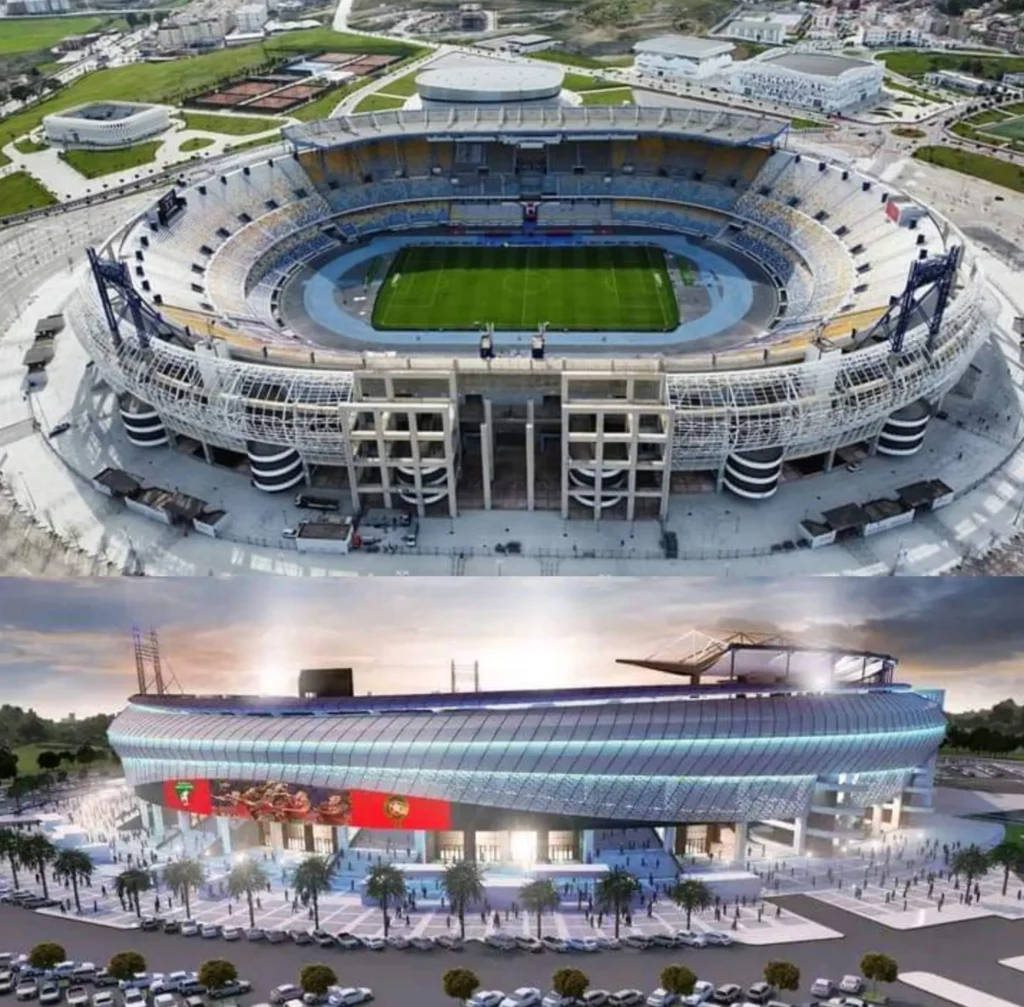
Morocco has outlined plans for several key stadiums to host World Cup matches:
- Hassan II Stadium, Casablanca: This new stadium is set to become the world’s largest football venue, with a capacity of 115,000 spectators. Drawing inspiration from traditional Moroccan tents, its design features a distinctive tented roof and surrounding gardens. Construction commenced in October 2023, with completion expected by 2028. The stadium aims to host either the opening match or the final of the 2030 World Cup.
- Fez Stadium, Fez: Currently accommodating 45,000 spectators, there are plans to expand its capacity to 55,800 to meet FIFA standards for World Cup venues. Renovations, like the demolishing of the athletics track, the addition of a 360º roof, the improvement of the exterior zones and landscape, the lowering of the level of the land, and the new parking lot,…are planned to be made.
- Marrakesh Stadium, Marrakesh: This stadium is slated for expansion to 45,860 seats to align with World Cup requirements, along with the lowering of the land level for a more comfortable view, the incorporation of the lower stands, and the removal of the athletics track.
- Adrar Stadium, Agadir: Plans are in place to increase its capacity to 46,000 seats, ensuring it meets the criteria for hosting World Cup matches by renovating the exterior spaces, landscapes, locker rooms and training spaces.
- Ibn Batouta Stadium, Tangier: Currently holding 65,000 spectators, this stadium is set for expansion to 75,600 seats to accommodate larger audiences during the tournament, by adding 2 levels more levels.
- Prince Moulay Abdellah Stadium, Rabat: Undergoing reconstruction to increase its capacity to 68,700, this stadium will serve as a key venue for the World Cup. A new multimodal station is under construction 500 meters away from the stadium to improve its connectivity.
Connectivity Projects
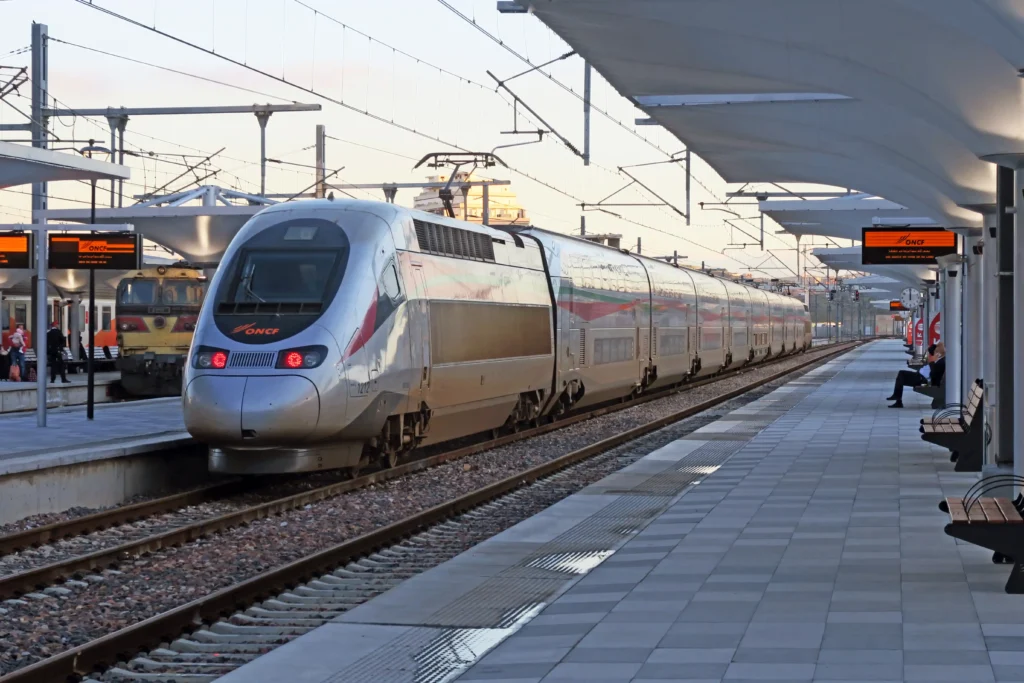
To support these venues and ensure efficient transportation for teams and fans, Morocco is investing heavily in its infrastructure:
- Airport Expansion: The government plans to double airport capacity from 38 million to 80 million passengers by 2030. Casablanca’s airport will handle 23.3 million passengers, while Marrakesh and Agadir will manage 14 million and 6.3 million, respectively.
- High-Speed Rail Network: Morocco is extending its high-speed rail line to Marrakesh (for 2030) and plans further expansion to Agadir, aiming to serve 87% of the population by 2040.
- Road Infrastructure: Significant investments are being made to enhance road networks, improving connectivity between host cities and ensuring efficient transportation for visitors.
- Stadium Accessibility: Efforts are underway to improve access to stadiums, including the construction of new roads and public transport links to facilitate the movement of large crowds during the tournament.
Financial Commitments
The African Development Bank (AfDB) has pledged substantial financial support for these projects:
- Initial Loan: An agreement for a loan of 350 million euros has been signed to enhance economic governance, improve water supplies, and establish an industrial zone at the Nador West Med port.
- Potential Additional Funding: The AfDB is considering an additional loan of 650 million euros to develop Morocco’s rail and airport infrastructure in preparation for the World Cup.
Digital Applications and Technological Enhancements
To provide a seamless experience for fans, Morocco is focusing on technological advancements:
- Digital Strategy Implementation: The country is developing a comprehensive digital strategy that includes the deployment of advanced technologies to ensure the smooth operation of the World Cup. This encompasses cybersecurity measures and crowd-management systems to enhance safety and efficiency.
Cultural Events and Fan Engagement
Recognizing the importance of cultural integration, Morocco plans to host various events to enrich the World Cup experience:
- Cultural Showcases: The nation intends to organize events that highlight Morocco’s rich cultural heritage, offering visitors an immersive experience of its traditions and arts.
- Fan Zones: Designated areas equipped with entertainment and viewing facilities will be established in host cities, providing fans with communal spaces to enjoy matches and participate in festivities.
Sustainability Initiatives
Morocco is committed to hosting an environmentally responsible World Cup:
- Green Infrastructure: The construction and renovation of stadiums and facilities are being carried out with sustainability in mind, incorporating eco-friendly materials and energy-efficient technologies.
- Public Awareness Campaigns: Initiatives to educate the public and visitors about environmental conservation and sustainable practices will be implemented throughout the tournament.
With ambitious stadium upgrades, cutting-edge connectivity projects, and a strong focus on sustainability, Morocco is poised to deliver an unforgettable World Cup experience in 2030. The nation’s efforts to improve its infrastructure and integrate cultural and technological elements will not only enhance the tournament but also leave a lasting legacy for future generations. As the plans unfold, Morocco is set to make history as a host for this prestigious global event.


